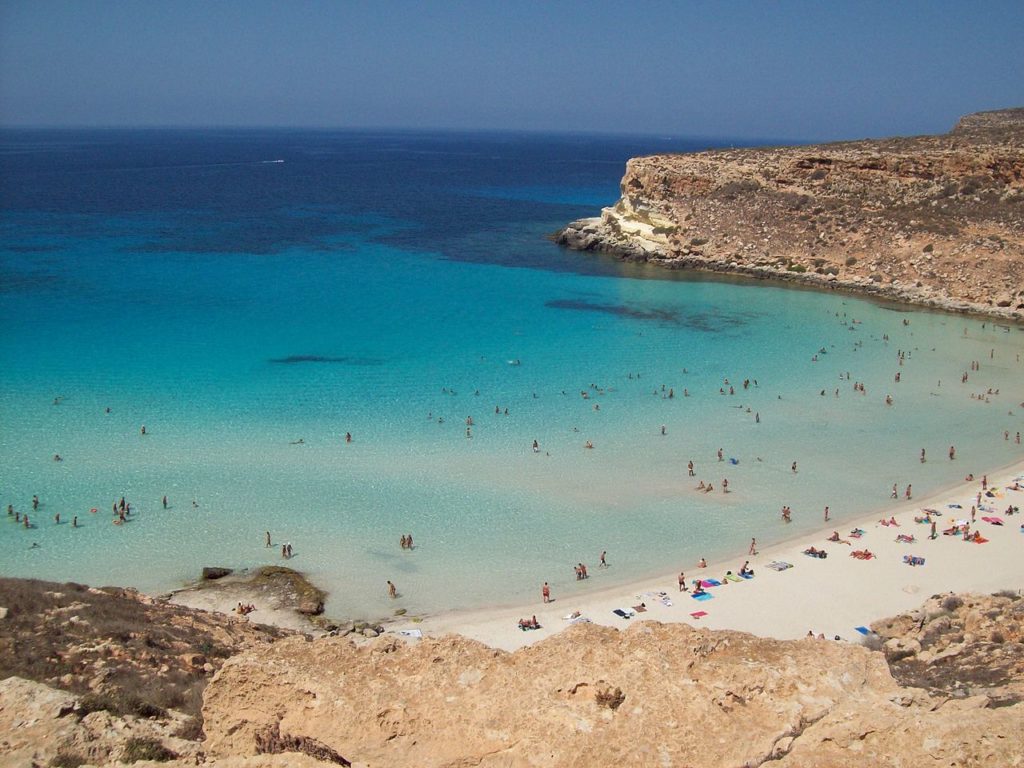The street lamps kept dangling from disrepair, the balconies crumbling, the unemployed young men shuffling from café to aimless walks, yawning even in their thoughts—a scene worthy of Fellini’s neorealist film, I Vitelloni. Fellini at his ironic best sets overgrown teenagers in a coastal town, a band of young bulls taunting road workers and pulling immature pranks on girls and women. My father said his kids needed a different future. Frasca Studio would soon close and one more family, my family of four, would become a statistic of the Sicilian diaspora. I had never heard the word “diaspora” until I came to America. In my hometown that history was not taught in school, far as I know. People just left. Like seeds transported by the wind one day they disappeared. Occasionally I’d hear my mother say that so and so, the American, was in town. That so and so could have a surname familiar to us, or one that had been Anglicized. The mysterious Mr. Nicholson might be searching for a distant relative—Nicosia.
We saw types on the streets of Vittoria during summer months. Mr. Nicholson in plaid shorts, white sweat socks and laced-up spectator shoes, walking with a small dictionary in hand—trying his best to ask for directions to somewhere his fourth cousin might be living. My friend Anna & I made fun of that guy. What was up with those tube socks paired with elegant leather shoes? But his Ray-Bans were more than acceptable to two girls wanting to tint the world a splendid green. O how we wanted to rip those aviators off the foreigner’s nose and take turns sporting them at the beach. Leap from one rock to the next, lean on every yew tree, look foxy sniffing the northern wind—Tramontana—cool on the skin. And we’d throw in some Paul Anka —Put your head on my shoulder, Baaaby, feeling euphoric though we didn’t understand the words. It’s hard to convey how that singer’s dreamy voice on my transistor gave rise to lidless imagination. Opportunity for a pose, look a bit coy. Tilt your head. There. No. It was better before. Keep the sunglasses in mind. Can’t you think of something more miraculous?
Here and there we’d see another American but demanded nothing from the Showoff, Buffuni—one hand pushing back his thick swirls of hair, the other spread on the steering wheel of a Peugeot convertible too big for cruising our narrow streets. The Buffuni wore his shirt unbuttoned. His gold necklace was thick as a fishermen’s rope. This clown made tons of money flipping pizza dough, my older brother said. One good bet he came back to look for a wife who cooks like his mother. She’ll polish his shoes, his teeth, his nuts and his toenails just to get to Brooklyn or New Jersey. My eighteen-year-old brother, Aldo, who could not openly hold a girl’s hand, carried around his little angry monsters and made Anna and I laugh until we almost suffocated.
If this isn’t important, nothing is, Aldo said. In the beginning God created an American for us to see on Via Cavour. A nostalgic old man, teary eyed, in and out of cafés, tasting every flavor of gelato until the metal shudders shut. The bogus noble in suit jacket with the widest lapels you ever saw and polyester pants that never lose their crease, U Babbu Amiricanu, the Dumb American. All over town the air is thick with rumor that a speeding motorcycle flipped him in the air and he thumped on the ground like a 65- kilos sack of potatoes. Aldo could not get his mind off how mannish that violence was. Anna asked to hear more. My mother slapped herself hard on the forehead, called her son Malacunutta, a word I find impossible to translate. It doesn’t mean not being polite—more like a fired-up entertainer setting hungry wolves to attack a poor captive bear.
I was nine years old, it was the place I happened to live in and be the victim of. What did I know about Mr. Nicholson longing to find his ancestral roots? What of those who had not quite died in the old country and not yet been born in the new, how they disassembled, reassembled, flying back and forth like the osprey’s need to return to its birthplace. Each had a personal survival at stake but who could see any beauty in that? This doesn’t quite answer the question: why are people obsessed with stereotyping? In my hometown we thought of all Italian Americans as “dumb” outsiders who dressed badly. They thought of us as their precious heritage.

Marisa Frasca is the author of Via Incanto: Poems from the Darkroom (2014—finalist for the Bordighera National Poetry Prize) and Wild Fennel: Poems and other Stories (2019, Bordighera Press). Her poems and translations have appeared in numerous literary journals and anthologies, among them: The Stillwater Review, Italian Americana, TheRed Wheelbarrow, Journal of Italian Translation, The Yale Poetry Series Anthology,Making Mirrors: Writing /Righting for and by Refugees Anthology. Frasca is the recipient of the Outstanding Riggio Scholar Award, 2010, from The New School where she received a BA, and she holds an MFA in poetry from Drew University. She currently serves on the Advisory Board of Arba Sicula, a non-profit organization that preserves and disseminates the Sicilian language, literature and folklore. Born in Vittoria, Italy, Frasca lives with her husband, Peter, in Manhasset, New York.


Comments are closed.